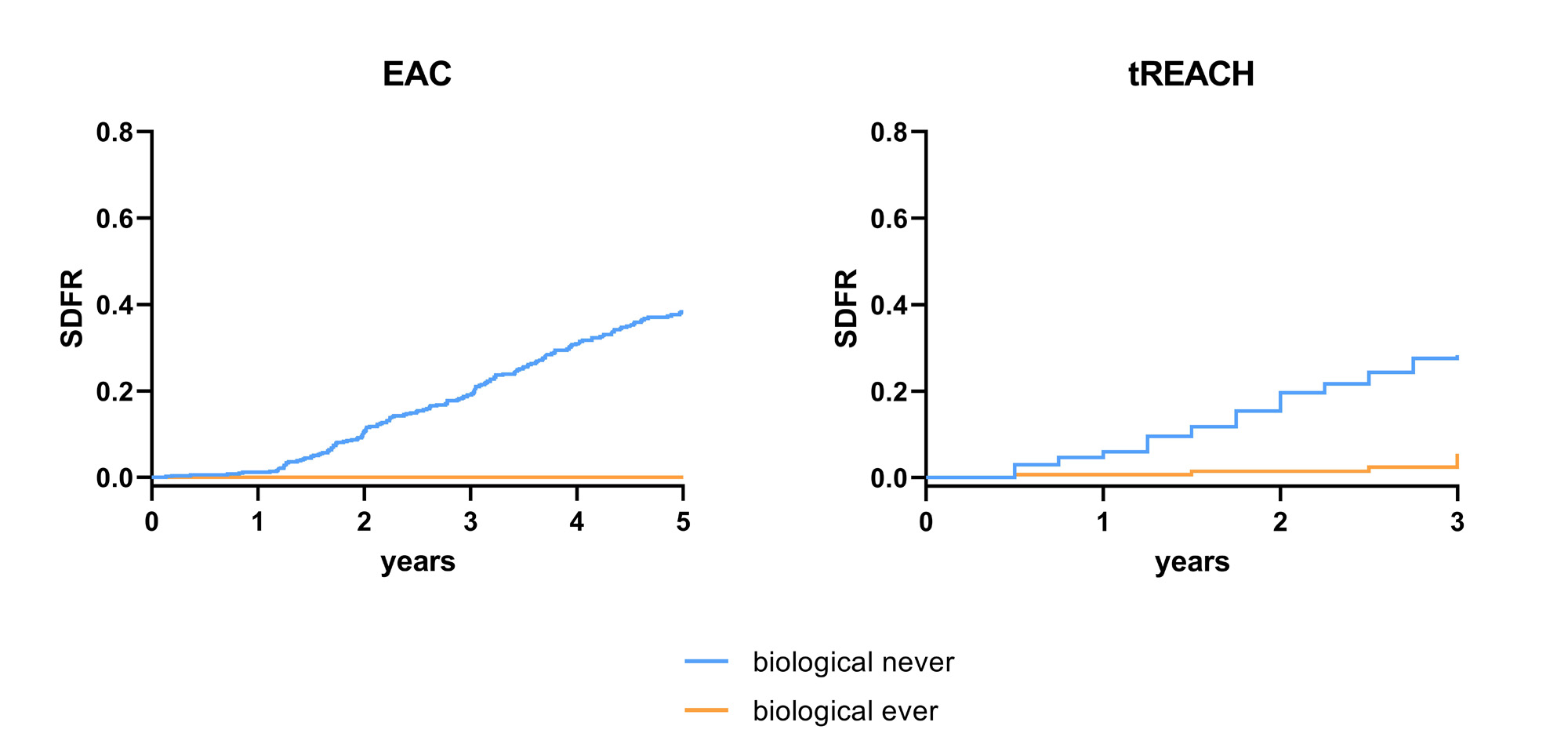Session Information
Date: Monday, November 13, 2023
Title: (1264–1307) RA – Diagnosis, Manifestations, and Outcomes Poster II
Session Type: Poster Session B
Session Time: 9:00AM-11:00AM
Background/Purpose: According to the 2022 EULAR recommendations for the management of rheumatoid arthritis (RA) complete cessation of DMARDs is not advisable due to a high risk of disease flares. On the other hand, DMARD-free remission (DFR) is proven to be achievable and sustainable in 10-20% of RA patients. This paradoxical notion can possibly be explained by the fact that the EULAR recommendations refer to evidence from RCTs investigating ACPA-positive RA-patients with high disease activity at inclusion. Generally, this subgroup is treated more often with biologicals, while in daily practice only part of RA patients use a biological (ascertainment bias). We therefore hypothesized that RA patients who are treated with biologicals are less capable of achieving sustained DFR (sDFR) than patients who are not treated with biologicals. We studied this in two different cohorts.
Methods: Patients who fulfilled the 1987 and/or 2010 criteria for RA from the Leiden Early Arthritis Clinic (EAC) and from the treatment in the Rotterdam Arthritis Cohort (tREACH) trial were selected. The EAC is a population-based inception cohort that includes early arthritis patients who are treated according to general guidelines. The tREACH was a treat-to-target strategy trial in which RA patients were treated according to protocol that included treatment intensification as well as tapering. RA patients that had been treated with a biological at any point in time during 5 (EAC) and 3 (tREACH) years of follow-up were compared to RA patients who had never used a biological in this period for the outcome of achieving sDFR. sDFR was defined as the sustained (≥12 months) absence of clinical arthritis after discontinuation of DMARD in both the EAC and tREACH. Differences in sDFR were visualised with Kaplan-Meier curves and tested with log rank tests.
Results: In the EAC 627 RA patients were followed for 5 years. None of the RA patients who ever used a biological achieved sDFR (0%), while 30% (162/538) of the patients who never used a biological achieved sDFR (p-value < 0.001; Figure 1). In the tREACH trial 425 patients were followed for 3 years; 3.2% (5/154) of patients who ever used a biological achieved sDFR, while 22% (60/271) of patients who never used a biological achieved sDFR (p-value < 0.001; Figure 1).
Conclusion: RA patients who use/used a biological have a negligible chance of achieving sDFR; in contrast to the large proportion of RA patients without biological use. Since the current RA management guidelines may suffer from ascertainment bias, future guidelines may be amended such that DMARD cessation is not discouraged in RA-patients without biologicals.
To cite this abstract in AMA style:
Heutz J, de Jong P, van der Helm-van Mil A, van Mulligen E. Rheumatoid Arthritis Patients Who Never Use a Biological During Their Disease Course Represent a Subgroup of Patients Likely to Achieve Sustained DMARD-free Remission [abstract]. Arthritis Rheumatol. 2023; 75 (suppl 9). https://acrabstracts.org/abstract/rheumatoid-arthritis-patients-who-never-use-a-biological-during-their-disease-course-represent-a-subgroup-of-patients-likely-to-achieve-sustained-dmard-free-remission/. Accessed .« Back to ACR Convergence 2023
ACR Meeting Abstracts - https://acrabstracts.org/abstract/rheumatoid-arthritis-patients-who-never-use-a-biological-during-their-disease-course-represent-a-subgroup-of-patients-likely-to-achieve-sustained-dmard-free-remission/

